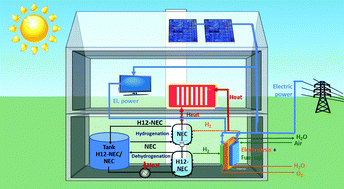Energy storage in residential and commercial buildings via Liquid Organic Hydrogen Carriers (LOHC)
Abstract
This contribution proposes the usage of Liquid Organic Hydrogen Carriers (LOHC) for the establishment of a decentralised energy storage network. Due to the continually increasing amount of renewable energy within the power grid, in particular in countries of the European Union, a huge demand for storage capacities develops that can hardly be met by large-scale systems alone. Because of their high storage density and good manageability LOHC substances permit the local storage of excess energy in residential and commercial buildings. Following the approach of a CHP system (‘combined heat and power’ or more precisely a ‘combined heat and storage’ system), thermal losses from the storage processes can be used for heating (and cooling) purposes in order to increase the overall efficiency. An evaluation of the economic feasibility identifies possible approaches to generate income from storage operation. The usage of exhaust heat for heating proves to significantly support the business case by providing a considerable financial contribution that is usually not exploitable for centralised storage units.


 Please wait while we load your content...
Please wait while we load your content...